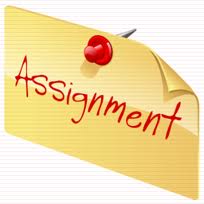Sponsored Links
PRACTICAL SUGGESTIONS ON HOW TO GIVE HOMEWORK EFFECTIVELY
 THE STUDENT'S KNOWLEDGE acquisition and skills development should not be limited in the four corners of the classroom where lessons and activities are time-constrained, and most of the time, teacher-centered. For that reason, it is important for teachers to employ mechanisms which will help their students to speed up the learning process, and at the same time, train their students to study independently. One of the many mechanisms that can be used to achieve these goals is to give Homework/Assignments.
THE STUDENT'S KNOWLEDGE acquisition and skills development should not be limited in the four corners of the classroom where lessons and activities are time-constrained, and most of the time, teacher-centered. For that reason, it is important for teachers to employ mechanisms which will help their students to speed up the learning process, and at the same time, train their students to study independently. One of the many mechanisms that can be used to achieve these goals is to give Homework/Assignments.
Merriam-Webster Dictionary defined Homework as “an assignment given to a student to be completed outside the regular class period.” Example of Homework/Assignment includes book reports, research projects, term papers, practice exercises, the popular “question and answer” about the upcoming lessons, etc. But, regardless of the type of homework assignment to be given, it is imperative for teachers to follow a general guideline in order for the homework/assignment to be effective in the learning experience of their students.
Here are some practical suggestions on how to give homework/assignment effectively:
- Homework/Assignment must be in sync with the current lessons being discussed inside the class.
- Identify the purpose of the Homework/Assignment and make it known to the students. This is a crucial element because according to Prof. Allison Boye, Ph.D. of the Texas Tech University, “Being transparent with your students and explaining why you are asking them to complete a given assignment can ultimately help motivate them to complete the assignment more thoughtfully.”
- Use open-ended questions (Gardner, 2005). This will allow the students to develop their critical and analytical thinking skills.
- Create homework/assignment that apply skills taught in the classroom to real-life situations within the home and community (Self, 2009).
- Homework/Assignment should not be given everyday because this will destroy the balance between the student's school and family life. A frequent homework assignment can "disrupt domestic routines and undermine relationships between parents and children and between spouses (Marling, 2003)."
-
Do not give too many questions or pratice exercises in your homework/assignment, because this will overburden the students, which, in effect, will destroy their focus, hampering their capacity to think with clarity.
-
Give FLEXIBLE guidelines on how students should accomplish their homework/assignment. This way, the student's creative mind will be utilized and enhanced.
About the Author:
Randolf Flores, the contributor, is a graduate of Bachelor of Science Major in Biology at the Far Eastern University, Manila. He is currently taking up Master of Arts in Science Education at the Rizal Technological University, Mandaluyong City.
References:
Boye, A. (2010). How Do I Create Meaningful and Effective Assignments? Retrieved January 10, 2014, from http://www.tlpd.ttu.edu/teach/TLTC%20Teaching%20Resources/CreatingEffect...
Dudley-Marling, C. (2003, March 7). How school troubles come home: The impact of homework on families of struggling learners. Current Issues in Education [On-line], 6(4). Retrieved January 10, 2014, from http://cie.ed.asu.edu/volume6/number4/
Gardner, T. (2005, June 12). Ten Tips for Designing Writing Assignments. Traci’s Lists of Ten. Retrieved January 15, 2014, from http://www.tengrrl.com/tens/034.shtml
Self, N. (October 1, 2009). Designing Effective Homework. ASCD Express, 4 (26). Retrieved January 18, 2014, from http://www.ascd.org/ascd_express/vol4/426_self.aspx





Comments
marky14
Tue, 02/18/2014 - 04:03
Permalink
additional suggestion...
Remie Rose Flores
Tue, 02/18/2014 - 18:31
Permalink
Agree
xleonado2006
Wed, 02/19/2014 - 01:21
Permalink
Additional Insight
Add new comment